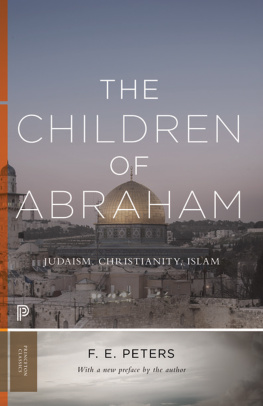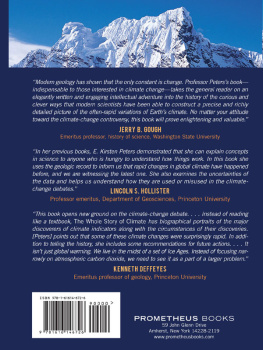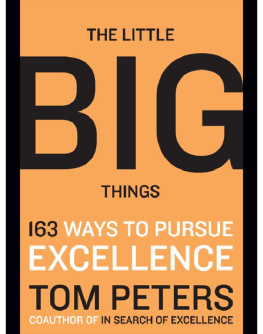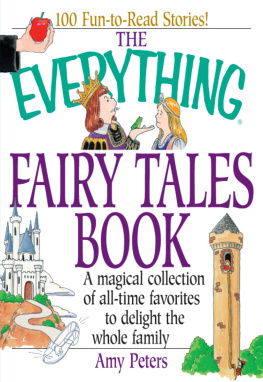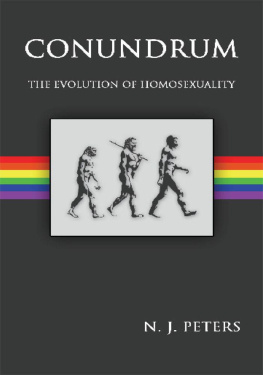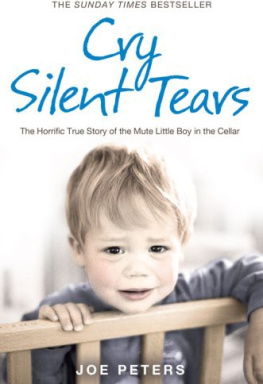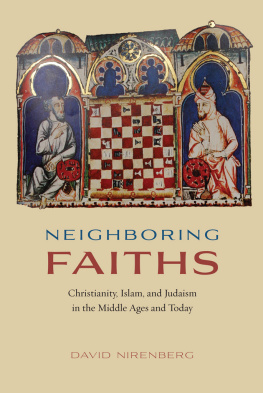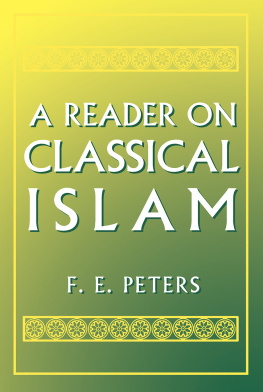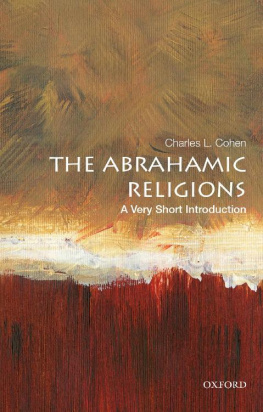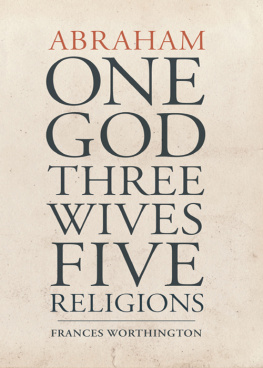
The Children of Abraham
The Children of Abraham
Judaism, Christianity, Islam
F. E. Peters
With a new preface by the author
PRINCETON UNIVERSITY PRESS
PRINCETON AND OXFORD
Copyright 2004 by Princeton University Press
Preface to the Princeton Classics edition, copyright 2018
by Princeton University Press
Published by Princeton University Press,
41 William Street, Princeton, New Jersey 08540
In the United Kingdom: Princeton University Press, 6 Oxford Street,
Woodstock, Oxfordshire OX20 1TR
Cover design by Michael Boland for thebolanddesignco.com
Cover images courtesy of iStock
All Rights Reserved
New Princeton Classics paperback edition,
with a new preface by the author, 2018
Paper ISBN 978-0-691-12769-9
The Library of Congress has cataloged the previous edition of this book as follows:
Peters, F. E. (Francis E.)
The children of Abraham : Judaism, Christianity, Islam
F. E. Peters.New ed.
p. cm.
Includes index.
ISBN 0-691-12041-2 (cl : alk. paper)
1. JudaismHistoryTo 1500. 2. Christianity.
3. IslamHistoryTo 1500. I. Title.
BM157.P47 2004
201'.4dc222004040049
This book has been composed in Janson
Printed on acid-free paper.
press.princeton.edu
Printed in the United States of America
1 3 5 7 9 10 8 6 4 2
For
Edward Peter Fitzsimmons
Contents
Preface to the Princeton Classics Edition
ix
Preface
xviii
The Scriptures: Some Preliminary Notions
1
The Promise and the Heirs
7
A Contested Inheritance
21
Community and Hierarchy
41
The Law
67
Scripture and Tradition
85
The Worship of God
103
Renunciation and Aspiration
116
Thinking and Talking about God
138
Sacred History
167
Notes
173
Glossary
213
Index
227
Preface to the Princeton Classics Edition
George Santayana once famously warned that those who did not remember history would be condemned to repeat it, presumably with baleful consequences. What is, however, equally harmful, and far more dangerous, is to ignore history or to misunderstand it.
To be sure, knowing the history of a religious community is not necessary to being saved; faith and observance are likely far better paths to the afterlife. But to ignore the history of religions like Judaism, Christianity, and Islam is not merely to misunderstand or disrespect those communities; it also diminishes ones capacity as a citizen on this earth and, as we are discovering, exposes us to civil liabilities of the first order.
In secular societies, religion has been formally separated from the public sphere and restricted to the narrow domain of the private and the personal. It appears quite differently to Abrahams heirs. Jews, Christians, and Muslims all worship a God, the same God, who has, through word and deed, intervened in the public spacethat is, in history, often and effectively. He has addressed his worshippers as a people, and not as individuals, and those same believers have, persuant to his instruction, organized themselves as communities: a Jewish qahal, a Christian ekklesia, a Muslim umma.
Whatever the intent of the separation of Church and State, it has had among its effects the banishment of religion and the history of its components from the curricula of public education, an institution dedicated to objective discussion and critical thinking. When there is an attempt, private or parochial at a religious education, it is often catechetical, offering instruction only in the rudiments of ones own faith, or else multicultural, an equable glance at everybodys faith.
Neither was my intention in writing The Children of Abraham. This book, and my others in the same vein, grew out of a strong conviction that, since Judaism, Christianity and Islam all spring from the same matrix that unfolds in the Bible book of Genesis, they constitute a family and should be studied and understood in triplicate. Aristotle pointed out that there is no science of the individual, but by studying these three individuals of the species Abrahamic in parallel, I thought to expose their common, but often forgotten and more often dissembled DNA. More, I hoped that in such a comparative context, synagogue, church, and mosque might cast a reciprocal and newly revealing light, one upon the other
If that is the biology of the three great monotheistic faiths, they also have an equally instructive, if somewhat less edifying, sociology. Christianity and Islam have been sibling rivals from their birth. Jews point to their unmistakable birthright as heirs to Gods promise to Abraham; Christians insist that they are Jacob to the Jewish Esau; and Muslims equally vigorously claim that Islam represents a New Abrahamic Covenant replacing the failed ventures of an earlier time.
These two elements, the profound similarity in their origins and aspirations and the equally profound differences that separate Judaism, Christianity, and Islam, were the foundations upon which The Children of Abraham was conceived and upon which the finished book rests; and, as we are coming to realize, they are elements that we ignore at our civil and secular peril.
This blindness to the religions similarities is in some ways understandable. Jews have not been eager to acknowledge their offspring, nor are Christians entirely forthright about their Jewish paternity even though their religions claims make no sense without it. The Quran is somewhat more willing to acknowledge the faiths Judeo-Christian heritage, honoring Jesus as a prophet and granting toleration to fellow People of the Book. Muhammad was, however, a statesman as well as a prophet, and asserting the primacy of his religion was politically necessary.
The three religions theological attitudes toward and political and social treatment of one another were always fraught in an environment dominated by religiously committed societies, where heresy was a crime and apostasy a capital offense. Now, in a far more secular world that ignores, disowns, or misunderstands religious motives and aspirations, the prospect has grown darker. We are faced, personally and collectively, with ideological and political choices of great consequence.
Can we make wise choices regarding Iran and Saudi Arabia without understanding the great Sunni-Shia divide? Can we think straight about the Jewish West Bank settlements without fully grasping the concept of Eretz Yisrael? The Children of Abraham attempted to fill these spaces in our understanding, an endeavor that is still needful. In the second half of the twentieth century, religious communities began to present bold new challenges to the society at large. Now, in the twenty-first, their more radical claims and aspirations threaten not merely globalism and the nation-state but Jews, Christians, and Muslims themselves, whether or not they promote or endorse those aspirations.
The Children of Abraham was written to explain those and other concepts central to the three monotheistic religions, simply to lay open the past of ideologies that have determined the way we are, whether or not we are believers, and whether or not we are aware of it. I tried to make this book accessible without over-simplifying what are complex notions, to fashion a narrative that is intelligible to the general reader and acceptable, and perhaps even illuminating to the expert. I did my best to be engaged with the matter without being invested in it. And finally, I hoped that Jews, Christians, and Muslims might find themselves in the text, even though the eyes of faith see things invisible to the scholar and, of course, vice-versa.
Next page
